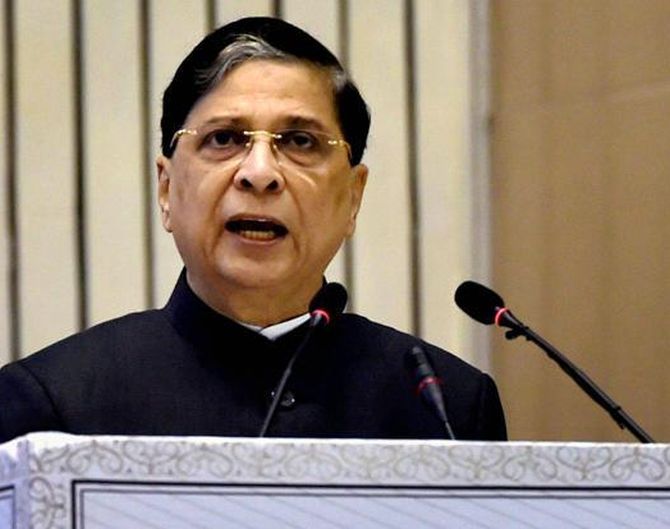 | « Back to article | Print this article |
For the first time in the history of India a motion for the impeachment of a Chief Justice has been moved.
The Congress and six other opposition parties on Friday submitted a notice for impeachment proceedings against Chief Justice of India Dipak Misra under "five grounds of misbehaviour".
But what is an impeachment motion and what is the process to sack an apex court judge?
What will happen to the CJI if the impeachment is successfully accepted?
All these answers and more, explained right here.

What the law says
Article 124(4) of the Constitution and the Judges (Inquiry) Act 1968 deal with the impeachment of a judge.
As described in Article 124(4), a judge can be removed on the grounds of "proved misbehaviour or incapacity".
However, neither misbehaviour nor incapacity is defined.
"Judge of the Supreme Court shall not be removed from his office except by an order of the President passed after an address by each House of Parliament supported by a majority of the total membership of that House and by a majority of not less than two-thirds of the members of that House present and voting has been presented to the President in the same session for such removal on the ground of proved misbehavior or incapacity," the Article says.
The impeachment process covered under Articles 124 (2) (b), 14 (4), 124 (5), and the Judges Inquiry Act 1968, has to be taken into account.
What is the procedure?
To remove a judge, or in this case the CJI, the motion needs to be raised in either House of Parliament and has to be submitted to the speaker of the Lok Sabha with the support of 100 MPs or the chairman of the Rajya Sabha with the support of 50 MPs.
The speaker or chairman holds the right to admit or reject the motion.
What if the motion is admitted?
If moved, this will be the first time ever in the country's history that an impeachment would be moved against the Chief Justice.
Then, the speaker or chairman constitutes a three-member committee to investigate the charges against the judge.
The committee consists of a Supreme Court judge, the Chief Justice of any high court, and a 'distinguished jurist' nominated by the speaker or chairman.
What if the committee finds any of the charges against the CJI to be true?
Parliament can then take up the consideration of the motion.
The House requires a special two-third majority to pass the motion.
After passing in one House (Lok Sabha/Rajya Sabha), the bill goes to the second House which also has to pass it with the special majority.
What next if the motion is passed by both Houses?
If the motion is passed by both the Houses, then an address is presented to the President for removal of the judge after which it is carried out by Presidential Order.
Has any judge impeached in the past?
No judge has ever been impeached in India.
The only time the process has got as far as the final step was in the case of Justice V Ramaswami of the Supreme Court in 1993.
However, the impeachment motion brought up in the Lok Sabha failed to secure the required two-thirds majority.
In 2011, the Rajya Sabha had found Calcutta HC judge Justice Soumitra Sen guilty of financial misappropriation as a judge and of misrepresenting facts, which had led to the Upper House to vote in favour of his impeachment.
But before the Lok Sabha could take up the impeachment proceedings, Justice Sen had tendered his resignation.
In 2016, Justice Nagarjuna Reddy of the high court of Andhra Pradesh and Telangana courted controversy when 61 Rajya Sabha members moved a petition for his impeachment on charges of misusing his position to "victimise" a "Dalit" Judge.
Later, nine of the 54 members of the Rajya Sabha, who had proposed the initiation of proceedings against him, withdrew their signatures.
How much time will the process take?
It is unclear as the investigation itself may not be completed by the time he is to retire in October 2018.
In previous cases, including Justice Ramaswami’s as well as Justice Soumitra Sen, the investigation by the committee had taken two years to be completed.